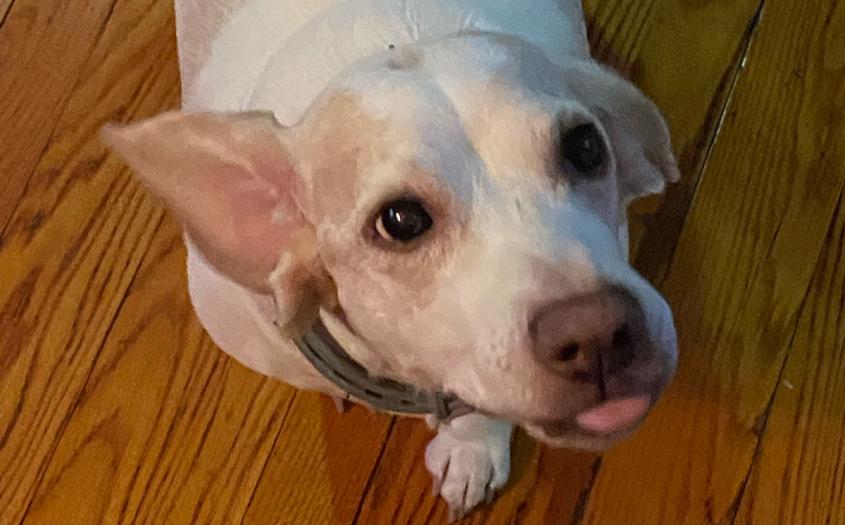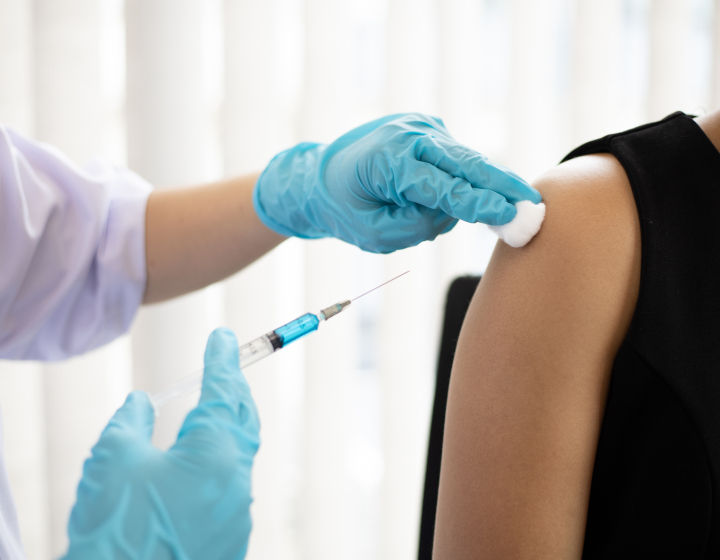A beagle’s sudden blindness reveals stage 5 lymphoma
Shortly after Christmas in 2020, Matthew Budinger noticed that his dog, Teddy, seemed to be walking into things and unable to see. Budinger and his wife, who live in Spencer, New York, drove their eight-year-old beagle about 20 miles north to Cornell University Hospital for Animals (CUHA), where Teddy had been treated in the past.
Since his major symptom was sudden blindness, Teddy was initially seen by the ophthalmology team for an emergency evaluation. After running some tests, the doctors discovered that he had been bleeding into his eyes. That and the fact that Teddy’s lymph nodes were swollen suggested that he probably had cancer, most likely lymphoma, which is the most common cancer in dogs.
“It’s very uncommon for lymphoma to cause ocular signs as severe as his, so it was kind of surprising,” says Dr. Brittany Schlesener, a resident in comparative ophthalmology. “But we do see animals that come in with ocular manifestations of disease and find they have significant disseminated disease elsewhere.”
Schlesener called CUHA’s oncology department immediately because Teddy was becoming critically ill quickly. When he first came in, she says he was relatively perky, but within a couple of hours he was dull and lethargic. The oncology department saw Teddy right away. After examining him and running tests, they diagnosed him with stage 5 lymphoma, the most advanced stage of the disease. Lymphoma is a blood cancer that starts in the lymph nodes, but it can infiltrate any organ in the body, including the eyes. They started him on chemotherapy that day.
“They said without treatment, he only had a couple months to live,” says Budinger. “With partial treatment we might be looking at a year, and with the full treatment he might go into remission.” The Budingers opted for Teddy to get the optimal treatment protocol, which would mean weekly trips to Cornell for two months, and then every other week until he completed the full course. He was given steroid drops to control the inflammation in his eyes.

The cost of cancer treatment for dogs is significant, and sometimes leaves owners unable to afford the highest level of care for their pets, even if they have pet insurance.
Fortunately, the Budingers were able to receive financial help from the Petco Foundation & Blue Buffalo Treatment Support Fund. The Petco Foundation and Blue Buffalo partnered with Cornell in 2016 to help subsidize cancer therapies for owners who otherwise could not afford them. Since then, the foundation has contributed $575,000 to Cornell, enabling over 200 families to pursue treatments for their pets.
“Being able to alleviate that burden of cost has been huge for owners,” says medical oncology resident Skylar Sylvester ’14, D.V.M. ’18, who is among the doctors caring for Teddy. “The moment we mention that we have this grant you can apply for, you can see the relief wash over the client’s faces. Certainly, it has greatly changed the quality of care we’re able to provide to a lot of pets that the pet parents could not afford otherwise.”
Within a week after starting treatment with chemotherapy, Teddy was able to see again and was “acting like a dog again,” says Budinger.
Sylvester says that at that point, Teddy’s cancer was already on its way into remission. “It’s really rewarding as oncologists to be able to see that kind of sudden improvement, to take a blind dog and to be able to make him see again, which we don't always get to do. The first day we saw him, he was really mopey, he was bumping into things. And then the next week he was wagging his tail, like a happy beagle.”
Teddy has remained in remission for almost a year after his diagnosis. He is seen regularly by the oncologists and ophthalmologists at CUHA, and receives daily non-steroidal anti-inflammatory drops for his eyes. Unfortunately, in late November 2021, Teddy’s lymphoma recurred. The Budingers have decided to continue his chemotherapy protocols with the Cornell team with the goal of bringing Teddy back into remission.
“Cornell is awesome,” says Budinger. “Without them, Ted would probably be gone by now, and I mean, he’s laying on the couch next to me right now... I couldn't have done it without them.”
Written by Christina Frank






